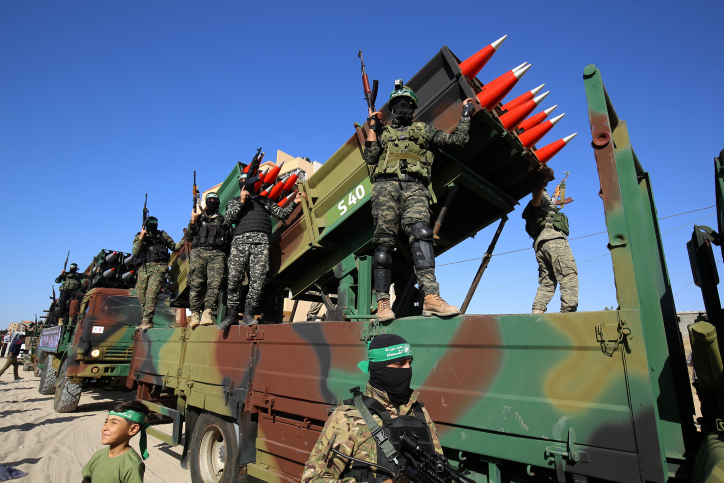According to a survey, 89% of Palestinians support establishing a government that includes or is led by Hamas.
By Akiva Van Koningsveld, JNS
The U.S. State Department on Thursday refused to rule out the possibility of the Hamas terrorist organization retaining power or joining a Palestinian Authority-led governing body for the Gaza Strip, Judea and Samaria.
“We have been clear about our position on Hamas, which the United States designated as a foreign terrorist organization in 1997 due to its premeditated, politically motivated violence perpetrated against noncombatant targets,” a U.S. government spokesperson told JNS.
However, “Palestinians’ voices and aspirations must be at the center of post-crisis governance in Gaza, unified with the West Bank under the P.A.,” the spokesperson said, adding, “Ultimately, the future of Palestinian leadership is a question for the Palestinian people.
“We remain committed to working with the P.A. and Palestinian leadership on the critical work of strengthening Palestinian institutions … and reinforcing commitments to nonviolence and countering terrorism,” concluded the official.
On Nov. 8, U.S. Secretary of State Antony Blinken said that Gaza must be handed over to the P.A. once Israel’s operation there ends. The solution “must include Palestinian-led governance and Gaza unified with the West Bank under the P.A.,” stated Blinken.
U.S. National Security Council spokesman John Kirby added that Washington seeks to back an authority that “has the support of all Palestinians so that they can effectively help with post-conflict governance, particularly in Gaza.”
According to a survey released last month, 89% of Palestinians support establishing a government that includes or is led by Hamas. Only around 8.5% said they favor an authority controlled exclusively by P.A. leader Mahmoud Abbas’s Fatah faction.
Hamas most deserving
A separate poll published on Wednesday by the Palestinian Center for Policy and Survey Research found that a majority of Palestinians believe that Hamas is “the most deserving of representing and leading the Palestinian people today.”
When asked which entity should rule the Gaza Strip after the Israeli military operation ends, 60% of the respondents selected the Iran-backed terrorist group; 88% of Palestinians said Abbas needs to resign.
In a presidential runoff between Abbas and Ismail Haniyeh, the Hamas leader would receive 78% of the vote, with 51% of Palestinians saying they would vote for Hamas candidates if Abbas called a general election today.
In addition, two-thirds expressed opposition to the participation of the P.A. in meetings with the United States. Only 1% of those surveyed said they were satisfied with the role Washington has played in the conflict.
Speaking with Al-Monitor in Doha on Monday, senior Hamas official Mousa Abu Marzouk said that the Islamist terrorist organization is “seeking to be a part of the PLO,” Abbas’s Palestine Liberation Organization, which controls the P.A.
On Thursday, Abu Marzouk clarified that “Hamas does not recognize the legitimacy of the Israeli occupation and does not concede any of the rights of our Palestinian people. We confirm that the resistance will continue to liberation and return.”
The remarks came as Haniyeh said he was open to discussing “a ‘Palestinian home’ in the West Bank and Gaza Strip,” leading to a “political path that secures the right of the Palestinian people to their independent state with Jerusalem as its capital.”
P.A. Prime Minister Mohammad Shtayyeh said on Dec. 8 that his preferred outcome of the war against Hamas would be for the terrorist organization to join a P.A.-led governing body as a junior partner.
“If they are ready to come to an agreement, and really accept the political platform of the PLO, accept the tools of struggle, … there will be room for talks,” he told Bloomberg, adding that “Palestinians should not be divided.”
Hamas is an “essential part of the Palestinian political mosaic” and Israel’s goal of eliminating the terrorist group is “unacceptable” to the Western-backed P.A., Shtayyeh declared this week.
The Palestinian leader has consistently refused to condemn Hamas’s Oct. 7 attacks, claiming the conflict didn’t begin on that date and Israeli officials have failed to speak out against “things done by their citizens.”
Hamas terrorists murdered at least 1,200 people in a massive terror attack launched from Gaza on Oct. 7, which included the firing of thousands of rockets, the infiltration of the Jewish state by terrorist forces, and the abduction of some 240 hostages.
The Oslo Accords, signed between Israel and the PLO in the 1990s, state: “The nomination of any candidates, parties, or coalitions will be refused … if such candidates, parties, or coalitions: commit or advocate racism or pursue the implementation of their aims by unlawful or non-democratic means.”
During a stormy discussion in Israel’s parliament this week, Prime Minister Benjamin Netanyahu said there is no way the P.A. will be allowed to rule Gaza in a post-Hamas reality.
“The difference between Hamas and the Palestinian Authority is only that Hamas wants to destroy us here and now, and the P.A. wants to do it in stages,” the premier said.


